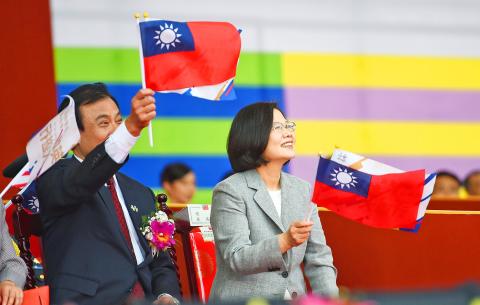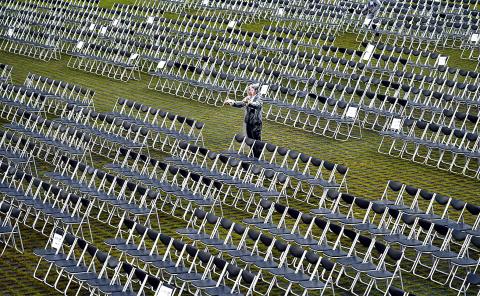President Tsai Ing-wen (蔡英文) in her Double Ten National Day speech yesterday called on China to act as a “responsible large nation” should — assuming a benign rather than quarrelsome role in the Asia-Pacific region and the world — as she vowed to maintain cross-strait peace and the democratic lifestyle of 23 million Taiwanese.
“Taiwan, at the forefront of the West Pacific, is under great pressure,” Tsai said.
China has in the past few years resorted to brow beating Taiwanese and restricting Taiwan’s international space, which has damaged cross-strait relations and is seriously challenging peace and stability across the Taiwan Strait, Tsai said.

Photo: Liu Hsin-de, Taipei Times
The redistribution of labor along the international supply chain, resulting from the US-China trade war, has disrupted international trade and increased the geopolitical complexity of the Indo-Pacific region, as well as cross-strait relations, the president said.
Some might demand a tougher stance from the government, while others wish for greater compromise, but Taiwan’s best course is to maintain stability in times of radical change, to face China’s pressure with equanimity and find a niche for survival, Tsai said.
This has been the government’s stance over the past two years, she said, adding that every responsible political figure and political party should resolve to uphold the greater consensus of the public.

Photo: Sam Yeh, AFP
The free and democratic way of life of 23 million Taiwanese — as well as efforts to ensure the sustainable development of the Republic of China, and maintain peace across the Strait and regional stability — must be continued, Tsai said.
“The government that I lead must show Taiwan’s toughness to the world,” especially when the world is overreacting to China’s rapidly expanding influence, she said.
Any unilateral attempt to change the “status quo” of cross-strait relations would never be accepted by Taiwanese, and any claim contravening universal values would never be recognized or supported by the international community, Tsai said.
Tsai guaranteed that Taiwan would not escalate tensions, but that the nation would not back down or compromise either.
“We will not move toward confrontation and conflict due to momentary passion, or move cross-strait relations toward danger — nor will we turn from the will of the people and sacrifice the sovereignty of Taiwan,” Tsai said.
Taiwan cannot afford miscalculations in times of such rapid change, she said.
“The solution is to maintain stability, remain flexible and seek advancement,” she said.
A strong nation is a prerequisite for any effective strategy, thus Taiwan must improve its national security and economic health, as well as a social safety net to make Taiwanese stronger, Tsai said.
The niche in which Taiwan can continue to survive is to become an even more indispensable member of the global community, she said.
The challenges that Taiwanese face are not limited to military threats, but also include diplomatic oppression, social infiltration and economic insecurity, she said.
The task at hand is to establish a comprehensive strategy and commence with efforts to strengthen national security, she said.
The first aspect of national security to be addressed is the strengthening of valuable diplomatic ties, and making the nation strategically invaluable, Tsai said.
During turbulent international developments, Taiwan — which is of great strategic importance geopolitically — must be resolute in its defense of democracy and the market economy, she said, adding that these things have served as the basis for Taiwan’s economic development and for the nation becoming a model of democratization in Asia, she said.
Facing pressure from China over the past two years, Taiwanese have demonstrated a high degree of resilience and determination in protecting their values, and like-minded nations have increasingly expressed their support, she said.
The second aspect to be addressed is the improvement of the nation’s defense capabilities, which involves a multi-tier approach, Tsai said.
Her stance has always been to steadily increase the defense budget each year, she said, adding that the military can satisfactorily defend the nation’s sovereign territory.
The third aspect is that the nation have a national security strategy capable of obstructing any attempt, foreign or domestic in origin, from destabilizing Taiwan’s economy, or its society, the president said.
Taiwan’s democracy must be defended at any cost — the government would not sit idly by if any country attempted to take advantage of that democracy to infiltrate and wreak havoc on Taiwanese society, she said.
Whether through the dissemination of disinformation, unauthorized acquisition of technology-related information, the compromising of information security systems or interference with the political system and elections, anyone proven to have committed such acts would be severely dealt with, she said.
The government has used international cooperation to counter the spreading of disinformation by parties in certain countries, she added.
Tsai said the lighthouse keepers, who were invited to sing the national anthem at yesterday’s ceremony, served as an analogy of Taiwan, which is like a beacon.
The nation’s democratization has been a light to outshine the darkness that Taiwanese had to pass through, and acts as a guide to all who seek democracies of their own, she said, adding that she hopes the people of Hong Kong and China be inspired by Taiwan.
“When the world sees Taiwan’s beauty, we will not be lonely,” she said.
“Taiwan will march bravely and resolutely forward. Taiwanese have always come together for the nation, deriving strength from unity,” Tsai said.

Tropical Storm Gaemi strengthened into a typhoon at 2pm yesterday, and could make landfall in Yilan County tomorrow, the Central Weather Administration (CWA) said yesterday. The agency was scheduled to issue a sea warning at 11:30pm yesterday, and could issue a land warning later today. Gaemi was moving north-northwest at 4kph, carrying maximum sustained winds near its center of up to 118.8kph and gusts of 154.8kph. The circumference is forecast to reach eastern Taiwan tomorrow morning, with the center making landfall in Yilan County later that night before departing from the north coast, CWA weather forecaster Kuan Shin-ping (官欣平) said yesterday. Uncertainty remains and

SEA WARNING LIKELY: The storm, named Gaemi, could become a moderate typhoon on Wednesday or Thursday, with the Taipei City Government preparing for flooding A tropical depression east of the Philippines developed into a tropical storm named Gaemi at 2pm yesterday, and was moving toward eastern Taiwan, the Central Weather Administration (CWA) said. Gaemi could begin to affect Taiwan proper on Tuesday, lasting until Friday, and could develop into a moderate typhoon on Wednesday or Thursday, it said. A sea warning for Gaemi could be issued as early as Tuesday morning, it added. Gaemi, the third tropical storm in the Pacific Ocean this typhoon season, is projected to begin moving northwest today, and be closest to Taiwan on Wednesday or Thursday, the agency said. Today, there would likely

DISRUPTIONS: The high-speed rail is to operate as normal, while several airlines either canceled flights or announced early departures or late arrivals Schools and offices in 15 cities and counties are to be closed today due to Typhoon Gaemi, local governments announced last night. The 15 are: Taipei, New Taipei City, Taoyuan, Tainan, Keelung, Hsinchu and Kaohsiung, as well as Yilan, Hualien, Hsinchu, Miaoli, Chiayi, Pingtung, Penghu and Lienchiang counties. People should brace for torrential rainfall brought by the storm, with its center forecast to make landfall on the east coast between tonight and tomorrow morning, the Central Weather Administration (CWA) said. The agency issued a sea warning for the typhoon at 11:30pm on Monday, followed by a land warning at 11:30am yesterday. As of

CASUALTY: A 70-year-old woman was killed by a falling tree in Kaohsiung as the premier warned all government agencies to remain on high alert for the next 24 hours Schools and offices nationwide are to be closed for a second day today as Typhoon Gaemi crosses over the nation, bringing torrential rain and whipping winds. Gaemi was forecast to make landfall late last night. From Tuesday night, its outer band brought substantial rainfall and strong winds to the nation. As of 6:15pm last night, the typhoon’s center was 20km southeast of Hualien County, Central Weather Administration (CWA) data showed. It was moving at 19kph and had a radius of 250km. As of 3pm yesterday, one woman had died, while 58 people were injured, the Central Emergency Operation Center said. The 70-year-old